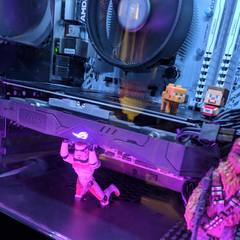Ryzen 9 7950x does not show temperature in Linux
Go to solution
Solved by johajoghurtman,
@Tymscar
I may have found the solution (if the problem still exists).
Starting with kernel 6.0, k10temp is also supported for the new Zen4 CPUs.
So in the end you only have to update the kernel of your operating system (In my case Linux Mint 21.1).
I simply followed the instructions on this page:
https://tipsonunix.com/2022/10/03/how-to-install-linux-kernel-6-0-on-ubuntu-linux-mint/


.png.255947720031a641abdac78e663b681c.png)














Create an account or sign in to comment
You need to be a member in order to leave a comment
Create an account
Sign up for a new account in our community. It's easy!
Register a new accountSign in
Already have an account? Sign in here.
Sign In Now